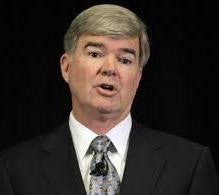
Emmert said college athletes themselves wouldn’t want to play against other athletes who were getting paid.
“They want to know everyone is playing by the same rules,” he said. “They want to know the other teams consist of student athletes just like them.”
Emmert took the witness stand Thursday in a landmark antitrust trial against the NCAA to say college sports would be fatally flawed if players were allowed to receive a portion of the billions of dollars in basketball and football television revenues now flowing into big conferences and colleges.
Emmert said one of the biggest reasons fans like college sports is that they believe the athletes are really students who play for a love of the sport and for their school and community. He said fans understand college players aren’t as good as professionals, but that doesn’t stop some programs from being more popular than professional teams.
“To convert college sports into professional sports would be tantamount to converting it into minor league sports,” Emmert said. “And we know that in the U.S. minor league sports aren’t very successful either for fan support or for the fan experience.”
Emmert’s testimony came in a much-anticipated appearance as the NCAA tries to convince U.S. District Judge Claudia Wilken that its system of so-called amateurism is not anti-competitive and is the best model for regulating college sports.




















